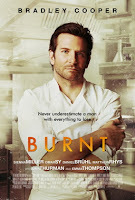Janice Hardy's Blog, page 7
March 20, 2024
What “Burnt” Can Teach Us About Conflict and Stakes
 By Janice Hardy, @Janice_Hardy
By Janice Hardy, @Janice_HardyThe whole point of creating conflict and stakes is to use them.
My husband and I are big fans of both cooking shows and movies about restaurants, so we were excited to see Burnt. While it let us down as a movie, it did provide a great example on why conflict and stakes are vital to a story.
Even better, it gave me a wonderful example of why a novel that is well written, has a solid idea, and all the right pieces, might keep getting rejected.
Because Burnt is technically well done. It has an amazing cast, great actors and acting, good production values, strong writing, solid bones in the story—what it lacks are the fundamental elements of good storytelling.Continue ReadingWritten by Janice Hardy. Fiction-University.com
Published on March 20, 2024 03:00
February 15, 2024
3 “Easy” Steps for Cutting Words from Your Manuscript
 By Janice Hardy, @Janice_Hardy
By Janice Hardy, @Janice_Hardy Deleting words from your novel is easier than you think.
Before I dive in, I'm guest posting at Writers in the Storm this week, with A Handy Trick for Brainstorming Your Plot. Come on over and say hello!
Getting rid of thousands of words from your manuscript is daunting. Having to cut tens of thousands of words can make you want to curl up in a ball and cry.
But trimming down a novel doesn’t have to be a huge hack and slash deal. You don’t have to rip your baby to shreds and gut the wonderful words that make the story shine. In fact, throwing away entire scenes often hurts more than helps, because you’re killing the story, not the extra words bogging that story down.
You want to get rid of the words that aren’t helping the story.
Continue ReadingWritten by Janice Hardy. Fiction-University.com
Published on February 15, 2024 06:11
January 24, 2024
Avoiding Awkward (or Unnecessary) Internal Questions
 By Janice Hardy, @Janice_Hardy
By Janice Hardy, @Janice_Hardy
Too many internal questions can come across like the author telling the reader what they ought to be wondering about.
Internalization is a powerful tool for showing who a character is, how they feel, and what's motivating them to act. It does a lot of the heavy lifting in both the character arc and the plot, because readers get to see the internal debates that lead to the choices they make in the story.
But it's easy to go too far with internalized questions. Internal questions shouldn't read like instructions on how a reader should interpret the scene.
When overdone (or done poorly), they can feel like you're whacking readers in the head with what they ought to be thinking or wondering about, instead of dropping clues that make them wonder about it. For example:
She crumpled the note in her hands. "Sorry?" she whispered. He walked out on her and all he could write was sorry? Was it another woman? Did he meet some hussy in the law school she paid for? Slaved for? Had he been using her all these years? That jerk. She'd never been anything but a cash cow to him. She flung the note across the room. How could he do this to her?While these are all questions someone in this situation would reasonably think, there leaves little here for readers to wonder about on their own. It also feels like the character's assumptions are indeed the case and there's no other possible reason for the situation. The questions lead the reader too much to one conclusion, and ultimately feels too on the nose. Even worse, it gives the story nowhere to go, as the character isn't doing anything to move the story forward, she's just spouting questions as if explaining why she was just dumped. Continue ReadingWritten by Janice Hardy. Fiction-University.com
Published on January 24, 2024 04:17
January 17, 2024
How to Write Description When You Hate Writing Description
 By Janice Hardy, @Janice_Hardy
By Janice Hardy, @Janice_Hardy Every novel needs description, even when you don't wanna write it.
I dislike writing description. Which is funny since I write science fiction and fantasy—two genres known for their abundant descriptions. I’d rather focus on what’s going on in the story and less on what everything looks like, but describing the world is a must for genre writers. If we don’t set the scene, the reader can’t ground themselves and be drawn into the story.
So, yeah, super important. And not only for genre writers.
Description is everywhere in every novel—what the characters look like, what the rooms look like, how the setting feels, how the action plays out. When you think about it, even dialogue and internal thoughts are describing how a character says something and how they think.
Continue ReadingWritten by Janice Hardy. Fiction-University.com
Published on January 17, 2024 06:53
January 3, 2024
Tighten Your Novel with a Preposition Patrol
 By Janice Hardy, @Janice_Hardy
By Janice Hardy, @Janice_Hardy A tighter novel helps keeps readers engaged in the story.
When I first started writing, my novels were long. Like, seriously long. This isn’t unusual for a new writer, and like countless ones before me, I set out to learn how to trim some of those excess words from my manuscript.
One of the things I discovered was the, “words you don’t always need” advice. On that list was “cut prepositions.”
I’d learned enough about writing at that point to know you shouldn’t heed advice without understanding the reasoning behind it, so I sat down and studied why prepositions and prepositional phrases were so awful.
What I found was—they aren’t.
Continue ReadingWritten by Janice Hardy. Fiction-University.com
Published on January 03, 2024 04:00
December 13, 2023
One the Road: Take Advantage of Your Reader’s Expectations

By Janice Hardy, @Janice_Hardy
I'm over at Writers in the Storm today with Take Advantage of Your Reader’s Expectations. Here's a sneak peek:
To strengthen your story, look at each scene as a reader would.
We writers spend a lot of time looking at our work like, well, a writer. We study plot and structure, pace and tension, character and dialogue, but how often do we think about how the reader is going to react to our story?
One of my critique groups is a “critique as we write” group. Every week, we turn in two chapters of our first drafts or whatever draft we’re revising. It’s a great way to keep our writing momentum going since we have people waiting for pages, but it’s had a much better benefit than we realized when we started the group.
We get real-time feedback about what readers expect to happen next.
This has utterly changed the direction of two of my novels so far, and both for the better.
Published on December 13, 2023 05:26
December 6, 2023
Description Is More than Just “What it Looks Like”
 By Janice Hardy, @Janice_Hardy
By Janice Hardy, @Janice_Hardy Choosing the right details to describe can be the difference between a scene that soars and one that falls flat.
I have a confession. I can’t stand description. I don’t like writing it, I don’t like reading it, it often just sits there on the page and does very little to enhance the story. Which for a science fiction and fantasy writer like me, is kinda a problem. I have entirely made-up worlds full of things that only exist in my imagination, and the only way I can bring those details to life for my readers is to, well, describe them.
It took me a long time, but I eventually learned that description wasn’t just a list of details and character features. And my stories got a lot better once I did.
Continue ReadingWritten by Janice Hardy. Fiction-University.com
Published on December 06, 2023 05:33
November 29, 2023
Are Your Characters Living in the Moment or Watching it Pass By?
 By Janice Hardy, @Janice_Hardy
By Janice Hardy, @Janice_Hardy
Put yourself in a scene before you put your characters there.
Years ago, there was a bit of a scare in the Hardy household. Our oldest cat took a tumble and hurt his hind leg. He was fine (he just limped for a few days), but until I knew he was okay, I was a basket case. For the rest of the day, I was a nervous Momma, and that continued until my little guy was back to his old self.
In the grand scene of things, it was no big deal.
To me, it was a huge crisis. Someone I loved was hurt.
Even worse, someone vulnerable I loved was hurt and needed my help.
Continue ReadingWritten by Janice Hardy. Fiction-University.com
Published on November 29, 2023 03:47
November 15, 2023
Telling Yourself to Show: How to Identify Flat Scenes
 By Janice Hardy, @Janice_Hardy
By Janice Hardy, @Janice_Hardy
We don't always choose the right scenes to dramatize in a story.
I wrote a scene for my third novel, Darkfall, where my characters were sitting at a table talking about stuff. Now, from a technical standpoint, there wasn't anything wrong with this scene. My protagonist, Nya, had a goal for what she needed to do at that table, and there were stakes if she failed.
This led to another scene where Nya was talking to someone else in a different room, gathering more information about things important to the story. It all advanced the plot.
But something felt off.
Continue ReadingWritten by Janice Hardy. Fiction-University.com
Published on November 15, 2023 04:00
November 8, 2023
Description Tip: Make “Sense” of Your Characters
 By Janice Hardy, @Janice_Hardy
By Janice Hardy, @Janice_Hardy You have five great tools for writing better descriptions, so why not use them all?
I’ll be honest—description is my least favorite thing to write. I always have to do a revision pass specifically to add more description, and I have critique partners who regularly whack me with the description stick when I slack off. So I created little games to make it more fun for me. One of them helps me focus and guides my brainstorming toward how my characters might see their world, and what ways they might describe their surroundings and experiences.
If you have a similar distaste of descriptions, or struggle with knowing what details to use, or you’re just looking for fun tips to help with description, try this:
Continue ReadingWritten by Janice Hardy. Fiction-University.com
Published on November 08, 2023 03:00



